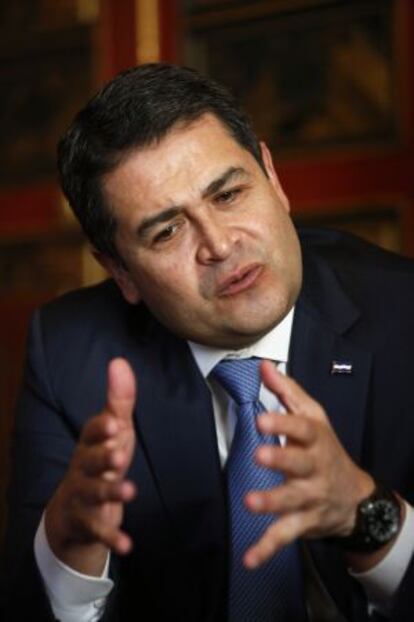“The war on drugs is not our war”
The US is partly to blame for the country’s immigration problems, argues leader


Honduran President Juan Orlando Hérnández wants to present his country as a hub of opportunities for investors. While visiting Spain on an official visit, the president is making an effort to paint a hopeful future for one of the most violent and poorest countries in the world, a country located on one of the principal routes for drugs entering the United States and a country often considered a failed state.
The wave of migrant minors that put Washington in a bind this summer came mostly from Honduras. Thousands of youths in search of something better than poverty, the Maras, extortion and murders... Hernández admits that these are the roots of the problem but he says Washington bears part of the responsibility: “What causes most of the violence in Honduras has to do with drug production in South America and massive consumption in the United States. Unfortunately, we are in the middle.”
He is sitting for this interview in Madrid’s baroque Casa América, which is filled with diplomatic and security personnel and members of the press. Hernández has just signed a four-year aid package worth €150 million with Spain. “The drug cartels and organized crime gangs are so aggressive in their illegal activities that they almost match acts committed by fundamentalist groups such as ISIS [Islamic State in Iraq and Syria]. That war is not ours. We have the ‘Alliance for Prosperity’ plan, which we signed with Guatemala and El Salvador to strengthen governance, work on inclusion, boost economic growth, and become effective in our efforts to punish crime. We need the participation of the United States. As I told Washington leaders, ‘If Central America remains tumultuous, violent and without opportunities, without economic growth, it will be a huge risk for the United States. On the other hand, if Central America is prosperous, in peace, and has opportunities, it will be a great investment’,” he explains.
What causes most of the violence in Honduras is drug production in South America and massive consumption in the United States”
Juan Orlando Hernández, President of Honduras
Hernández is a trained jurist and a member of the right-wing National Party. He took office in January, proposed a tough plan against drug trafficking, and promised to improve security. According to the United Nations Office on Drugs and Crime, Honduras had the highest homicide rate in the world in 2012. The organization recorded 90 murders for every 100,000 residents. In 2013, the Honduran Observatory on Violence registered 79 homicides for every 100,0000 residents.
When asked what his government is doing to make sure Honduras ceases to be a country from which its citizens flee – leaving aside the responsibility of the United States – the president reveals a large catalogue of plans, programs and measures. “We have built an air blockade, because a lot of the drugs came in that way, and we have done so on our own. The United States has a law that prevents them from doing something like that [i.e. shooting down light aircraft suspected of carrying drugs] but in the end it is our sovereign right. We have built a land shield and, with the aid of the United States, a maritime shield. We are in the middle of an important purge of the police because organized crime has infiltrated a large number of sectors within the judiciary, and for the first time some judges, prosecutors, police officers and soldiers have been tried and sentenced.”
Although drug trafficking has replaced authorities in some parts of the country, Hernández says he has “regained control” and “people have started to breathe better in places where criminals have been extradited. Others have had their properties seized and some flee when faced with arrest warrants.” He says he is following “Colombia’s example” by deploying military police. Colombia, he says, “used its military forces and today is it a success story in this fight.” Hernández also says Honduras’s “respect for human rights” minimizes the risk of abuse that such a strategy carries.
The battle fronts are multiplying in front of the Honduran president but he says he “sees opportunities in every problem.” According to 2013 reports from the World Bank, 64 percent of Hondurans live in poverty. Hernández shares a detailed account of his plans for small-business owners, programs for public housing and conditional subsidies for school children where “we are creating a plan to provide a full meal and not just school snacks.”
Hernández says he receives visits from investors every week. “They are betting on solar energy, photovoltaics, geothermal energy... I am convinced that in three years we are going to be leaders in energy prices in Central America and we are going to be able to export,” he says. Then, he explains his plan for building a logistical interoceanic channel so that “you can send a container from the Atlantic to the Pacific via the shortest distance: 392 kilometers.”
Despite his optimism, he admits that the country “has not recovered from the economic impact” of the coup d’état that toppled Manuel Zelaya in 2009. He does, however, believe that “there are fewer differences between members of our society.” He aspires, he says, to see “a large number of Hondurans who are over there [in the United States] saying ‘I am going to be better off in Honduras’ in three or four years.”
Translation: Dyane Jean François
Tu suscripción se está usando en otro dispositivo
¿Quieres añadir otro usuario a tu suscripción?
Si continúas leyendo en este dispositivo, no se podrá leer en el otro.
FlechaTu suscripción se está usando en otro dispositivo y solo puedes acceder a EL PAÍS desde un dispositivo a la vez.
Si quieres compartir tu cuenta, cambia tu suscripción a la modalidad Premium, así podrás añadir otro usuario. Cada uno accederá con su propia cuenta de email, lo que os permitirá personalizar vuestra experiencia en EL PAÍS.
En el caso de no saber quién está usando tu cuenta, te recomendamos cambiar tu contraseña aquí.
Si decides continuar compartiendo tu cuenta, este mensaje se mostrará en tu dispositivo y en el de la otra persona que está usando tu cuenta de forma indefinida, afectando a tu experiencia de lectura. Puedes consultar aquí los términos y condiciones de la suscripción digital.








































